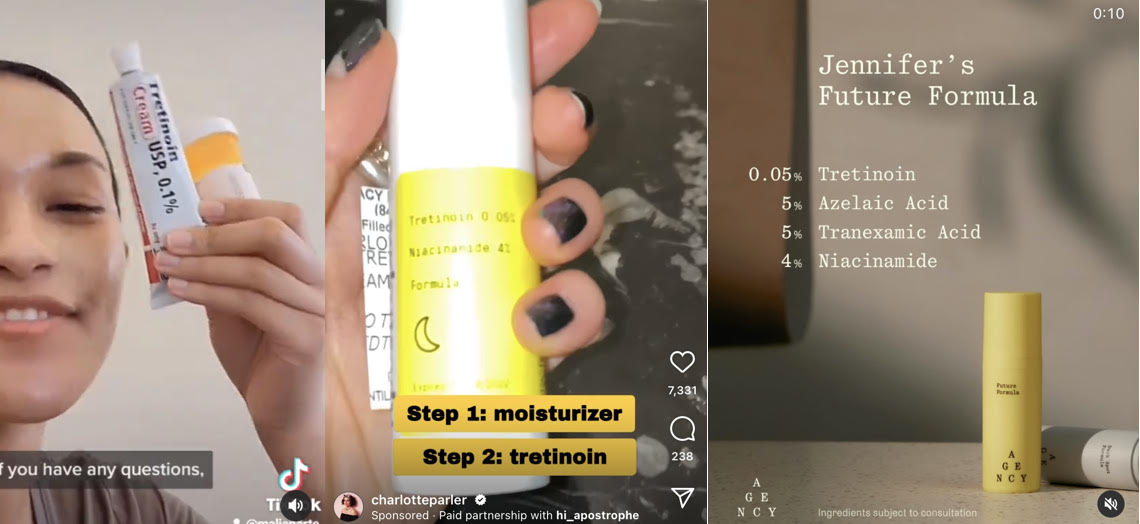For over half a century, tretinoin has been around as a common acne medication. But prescription packaging and stigma around acne have long meant it was kept hidden away in the medicine cabinet. That’s all changing: thanks to open discussions of skin care on social media, it’s now becoming a status symbol.
“People feel like you graduate to tret[inoin],” said Charlotte Palermino, skin-care influencer (336,000 followers on TikTok; 226,000 on Instagram) and the co-founder of Dieux. “Tret is cool. If you use tret, it’s like, ‘Oh you’re legit.’”
Palermino is one of the legions of skinfluencers on Instagram, TikTok and Twitter publicly hyping the benefits of the topical retinoic acid, which can only be accessed as a prescription in the U.S. As consumers have amped up their research on effective ingredients, Google searches for tretinoin have increased 12.7% in the past year and are expected to grow by 25% in the next year, according to trend forecaster Spate. Contributing to the trend are the rising popularity of science-focused influencers, a telemedicine boom and interest in tretinoin for reasons beyond acne.
Palermino began posting information about tretinoin on her TikTok and Instagram accounts after she started using it for the first time in 2019. Starting it in her 3os, she posts about its benefits beyond acne, including wrinkle improvement, cell turnover and skin texture, which are growing reasons for use among the online “skintellectual” community. Other influencers posting about tretinoin range from experts such as doctors and estheticians to individuals sharing their own results with the product.
“We have more dermatologists on Instagram. We have more scientists on Instagram. And when you’re talking about a well-researched ingredient, it’s going to be tret,” said Palermino.
The growth of skinfluencers talking openly about acne on social media has also spurred visibility for the product.
Tretinoin is the “most popular topic” for TikTok and Instagram skinfluencer Malia Narte, who posts about dealing with acne. She said her audience is interested in the topic “since it’s a very difficult product to use,” with people unsure of how to fit it into their skin-care routines and avoid irritation or interaction with other ingredients.
Influencers such as Palermino have pointed out the disturbing history of how tretinoin was first developed. There have been calls for universities to dissociate with the name of the dermatologist who developed tretinoin, Albert Kligman, who performed experiments on incarcerated people.
Telemedicine startups such as Nurx, Apostrophe, Ro Derm (formerly Rory), Hers, Hims, Curology and Agency and are making tretinoin more accessible than the era in which a trip to a doctor was required. They’re also tapping into skinfluencers, investing in ads to even further get the word out about the products. Palermino has done sponsored content for Apostrophe, while Narte has done a sponsored campaign promoting tretinoin with Nurx.
“You’re definitely seeing an enormous rise in telemedicine brands,” said Palermino. “They’re absolutely reformatting how consumers are being educated.”
“These days, people have easier access to skin-care education through platforms like Instagram, TikTok and YouTube. They’re learning about the effectiveness of prescription ingredients like tretinoin, and they want in,” said Whitney Tolpinrud, associate medical director of Curology and Agency.
“Everybody talks about tretinoin as the Holy Grail of acne products,” said Dr. Jill Boroniec, a telemedicine physician at Nurx, of tretinoin. She has seen social media spur interest in it. “We’re definitely having people coming in and requesting prescription-strength retinoids, and a lot of that is probably from social media.”
Nurx, which entered the telemedicine space with birth control, recently added skin care in the spring of 2021. It offers prescriptions for both acne and anti-aging.
Telemedicine offerings also make the product available to a consumer base that wouldn’t normally go to a dermatologist.
“Getting in with a dermatologist, depending on where you are in the country, can take months or [it] might not be feasible. Since it’s more available, patients are interested in it,” said Boroniec.
Cost can be prohibitive for tretinoin, which can retail for up to $200 a tube with no insurance or an unmet deductible. Some U.S.-based skin-care influencers have posted about taking trips to Mexico to stock up on cheaper tretinoin.
During the pandemic, there has been a growing emphasis on clinical and science-backed skin care, which has especially sparked interest in science-focused influencers and debunking false claims.
“The reality is that after the pandemic, we’re all looking for things that had scientific backing, and it’s abundantly clear that a lot of cosmetic companies are not necessarily backing some of the things that they’re claiming with a lot of research,” said Palermino.
“Because the generalized population is starting to get more interested in science, brands are going to have to invest more in educating consumers about the science behind their products, but in a way that’s not so watered down that it becomes misinformation,” Narte said.
Not all over-the-counter brands treat prescription skin care as a competitor. Dieux’s Instagram account actually posts a recommended skin-care routine that includes both the brand’s serum and prescription tretinoin, highlighting that they can be used together.
“When you’re looking for results, prescriptions can make claims. A lot of cosmetics can only make soft claims,” Palermino said.




